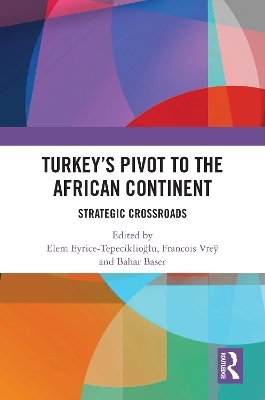
Turkey’s Pivot to the African Continent
Routledge (Verlag)
978-1-032-76669-0 (ISBN)
Rather than taking policy discourses for granted, the chapters in this volume unpack the overall effectiveness of Turkey’s Africa strategy on the ground. Starting with an analysis of Turkey’s role conception as a centre country, the book continues with an examination of the impact of Turkey’s embassies on trade with Africa. It also provides insights into the statements, accomplishments and the effectiveness of Turkey’s summit diplomacy with the continent, exploring the intricacies of resource control in its Africa policy beyond the conventional soft-hard power binary. The book delves into its humanitarian assistance during the Covid-19 pandemic, uncovers the maritime nexus in Turkey’s African agenda, examines its arms exports to Africa and elucidates the nature of these transactions. It offers a nuanced understanding of Turkey’s growing engagement in the continent, making it an essential read for the scholars, researchers, policy makers and anyone intrigued by the dynamic interplay between Turkey and African countries. This book will be useful for students, researchers and scholars of politics and international relations broadly, and particularly relevant for anyone interested in Turkish foreign policy and politics, African politics and Eurasian geopolitics.
The chapters in this book were originally published as a special issue of the Journal of Balkan and Near Eastern Studies.
Elem Eyrice-Tepeciklioğlu is Associate Professor and the Head of the Area Studies Department at Social Sciences University of Ankara, Turkey. She studies African Politics, Turkey-Africa relations and emerging powers in Africa. She is the co-editor of Turkey in Africa: A New Emerging Power? (Routledge, 2021). Francois Vreÿ is a National Research Foundation (NRF) C1-rated researcher in Humanities/Social Sciences. He is a former lecturer in the Military Strategy Department, Faculty of Military Science, Stellenbosch University and currently the research coordinator for SIGLA. He lecturers at the University of Namibia, Military Colleges such as the South African National Defence College and the Royal Danish Defence College (RDDC). Bahar Baser is Associate Professor at Durham University's School of Government and International Affairs, UK. She is also a visiting fellow at the Security Institute for Governance and Leadership in Africa (SIGLA). She is an expert in the area of diaspora studies, peacebuilding and conflict transformation.
Introduction Turkey and Africa: Motivations, Challenges and Future Prospects 1. Turkey-Africa Relations and Turkey’s National Role Conception as the Centre Country: Continuity or a Break with the Past? 2. Beyond the Soft–Hard Power Binary: Resource Control in Turkey’s Foreign Policy Towards Sub-Saharan Africa 3. Turkish Humanitarian Assistance During the COVID-19 Pandemic: Focus on Africa 4. Exploring the Maritime Nexus in Turkey’s African Agenda 5. (Exploring) the Impact of Turkey’s Embassies on Trade with sub-Saharan Africa 6. No Strings Attached: Understanding Turkey’s Arms Exports to Africa 7. Summitry Diplomacy in Turkey–Africa Relations: Statements, (Non-)Accomplishments and Effectiveness
| Erscheinungsdatum | 11.07.2024 |
|---|---|
| Verlagsort | London |
| Sprache | englisch |
| Maße | 174 x 246 mm |
| Gewicht | 412 g |
| Themenwelt | Sozialwissenschaften ► Politik / Verwaltung ► Europäische / Internationale Politik |
| Sozialwissenschaften ► Politik / Verwaltung ► Staat / Verwaltung | |
| ISBN-10 | 1-032-76669-7 / 1032766697 |
| ISBN-13 | 978-1-032-76669-0 / 9781032766690 |
| Zustand | Neuware |
| Haben Sie eine Frage zum Produkt? |
aus dem Bereich


